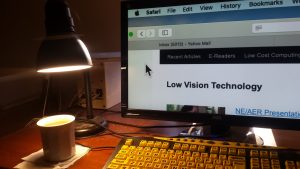
A little more light, extra contrast and magnification from the Mac Accessibility setting…and of course, some dark roast coffee, make all the difference!
This morning, I sat down to my home computer, and had a real moment of gratitude. The desktop opened on my Mac, on a 22 inch monitor, the screen was magnified using the the accessibility settings that are built into the Mac, and my high contrast keyboard–large print black letters on yellow keys, makes typing for hunt-and-peck typists like myself, so much easier! Easier still with the task light near the keyboard, which is nothing fancier than an LED light from the local grocery store, about 60 watts, in a goose-neck, student-style, lamp. The only thing fancy here is the Keys-U-See keyboard which was purchased from Ebay for about $30.
My gratitude came from my comfort and productivity with this set-up , and the discomfort and frustration I felt 20 years ago, trying to make things work, as someone new to low vision (vision that is no longer correctable to better than 20/60-20/70 acuity).
Briefly, I remembered the embarrassment I felt when I was at a client’s home showing home the website I’d designed for his B&B on a laptop, and struggling to see the the screen and make edits to the text. Although it was a beautiful website, I imagined him thinking, “How can this guy who can’t see the computer screen possibly design a website.” There were many moments like that,
It took me a long time to reach out and ask for help from Maine’s Division for the Blind and Visually Impaired (DBVI), by phone (877-594-5627),and subsequent referrals to the Maine Center for the Blind and Visually Impaired, now The Iris Network (207-774-6273), and Vision Rehabilitation Therapists, like Mary Beth Walsh, now Mainely Access (207-650-8151). I wasn’t blind and my vision would improve from the fancy proton beam therapy in Boston…it would all pass, and I’d return to being the 40 year old working for the local tech company designing websites on the side.
It didn’t pass the way I expected and I crashed and burned. It wasn’t pretty. Before I started to regain my bearings I lost both jobs, a partner of 10 years, my retirement savings, nearly lost my home, and I’m certain my 14 year old son was wondering what had happened to his father!
I’m grateful these unexpected events can change over time, sometimes offer new opportunities, and that there are people (some of whom have experienced vision loss themselves) and agencies, like the ones mentioned, who are available to offer resources, when we are finally ready to reach out!
And by the way, none of the rehab professionals cost me a dime out-of-pocket! Part of my initial reluctance was assuming, that like the medical professionals, this retooling and training would cost a lot–it didn’t. These vision rehab professionals are perhaps one of the best kept secrets and bast uses of tax dollars we often don’t know about, until we need them!
If you live outside Maine, chances are, your state also has an agency like DBVI either as part of the state’s Department of Labor, or more likely, Department of Education. There may also be non-profit agencies for the blind and visually impaired with some of these professionals:
- certified vision rehabilitation therapists (CVRT) to help with adapted daily living skills;
- , orientation and mobility specialists (COMS) to train clients how to get from here to there with less vision;
- low vision therapists (CLVT), to train clients on the use of low vision aids;
- vocational rehab counselors (CRC) will get you back to work with a vision loss;
- Assistive Technology (AT) Specialist (CATIS) to get you back to your computer, tablet or gadget of choice with less vision.
Look up these resources using the VisionAware Directory of Services, where you can search by state or category of resource.
It is great to be on the other side of a transition like this, and I’m grateful for the support and resources (and the great technology improvements) that pointed me back to the path I was on, and frankly, improved it in ways I never would have imagined possible. As I’m writing this, the New Year is fast approaching, and if there is just one person who reads this, and makes a call to DBVI, or their state’s resources, I’ll have paid a little back!
Additional Resources:
Maine Senior News (Jan/Feb 2018, page 11) Doing More About Your Vision Loss
Eyes on Success Interview with Maribel Steel, author of Blindness for Beginners and VisionAware Peer
